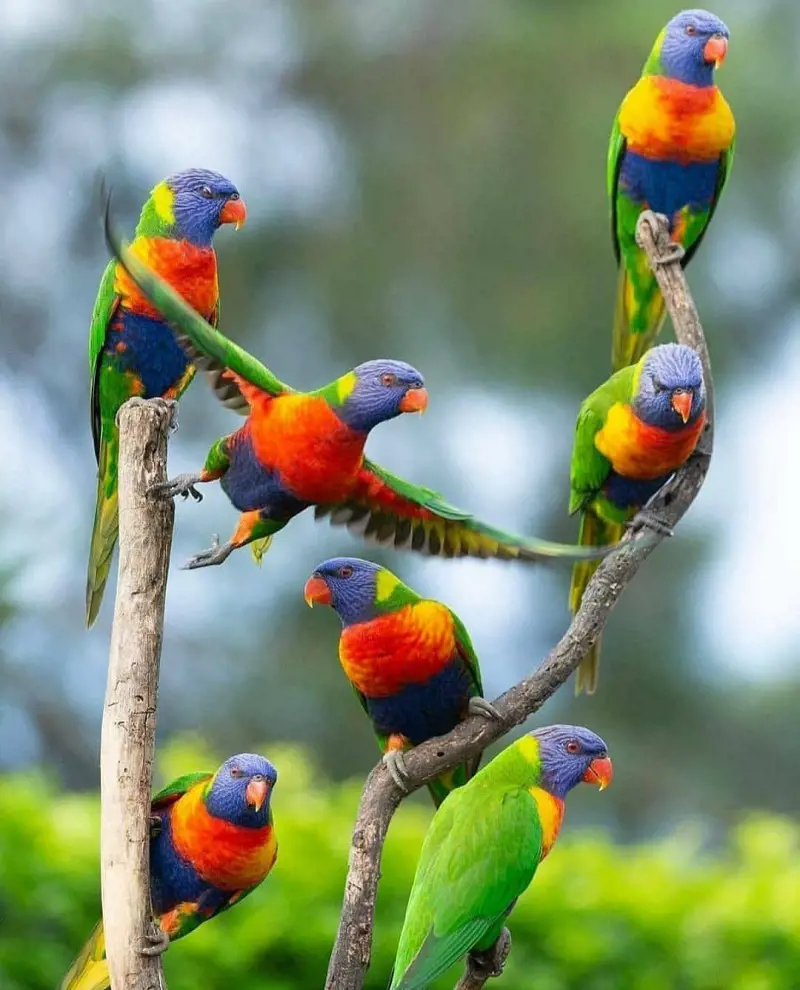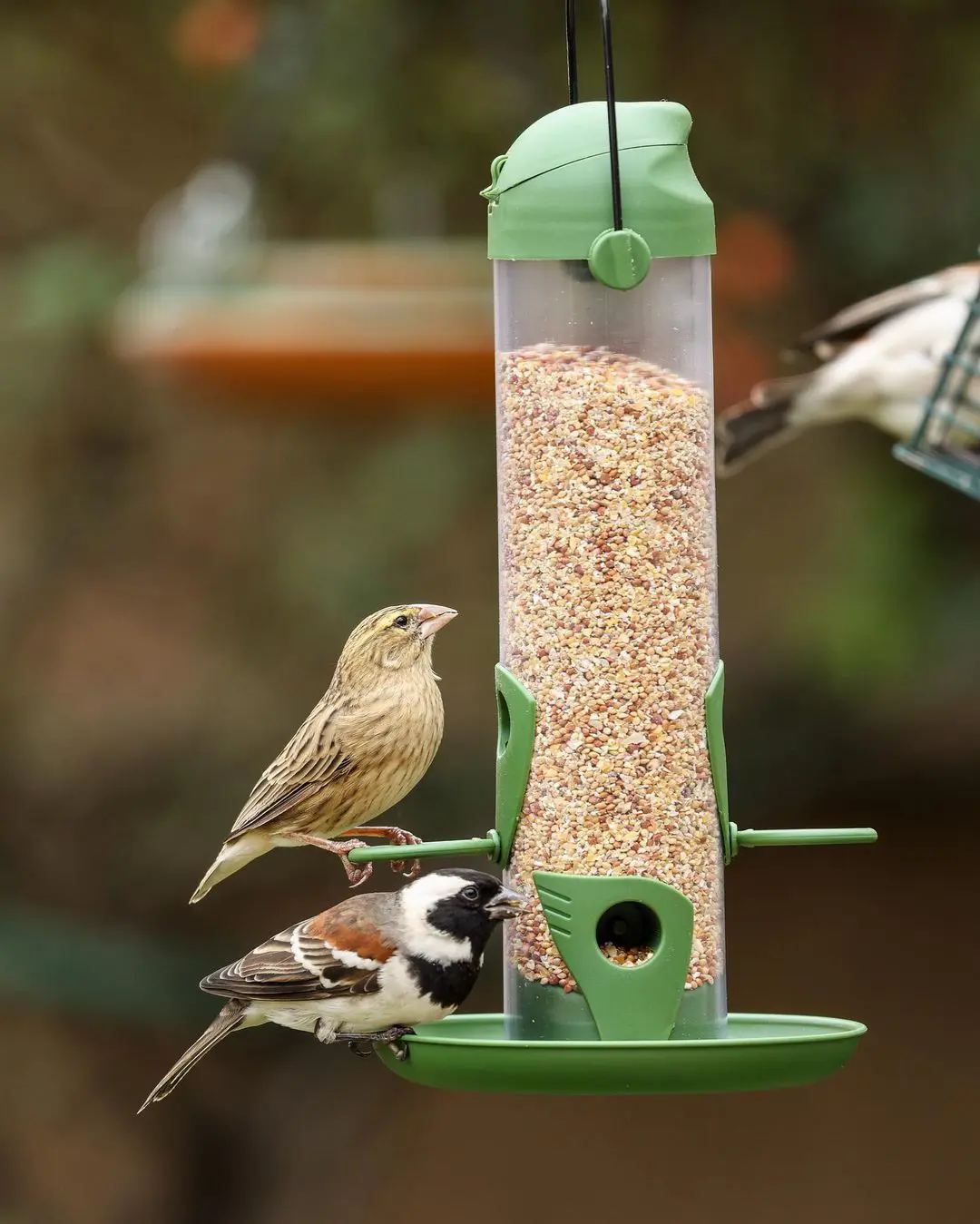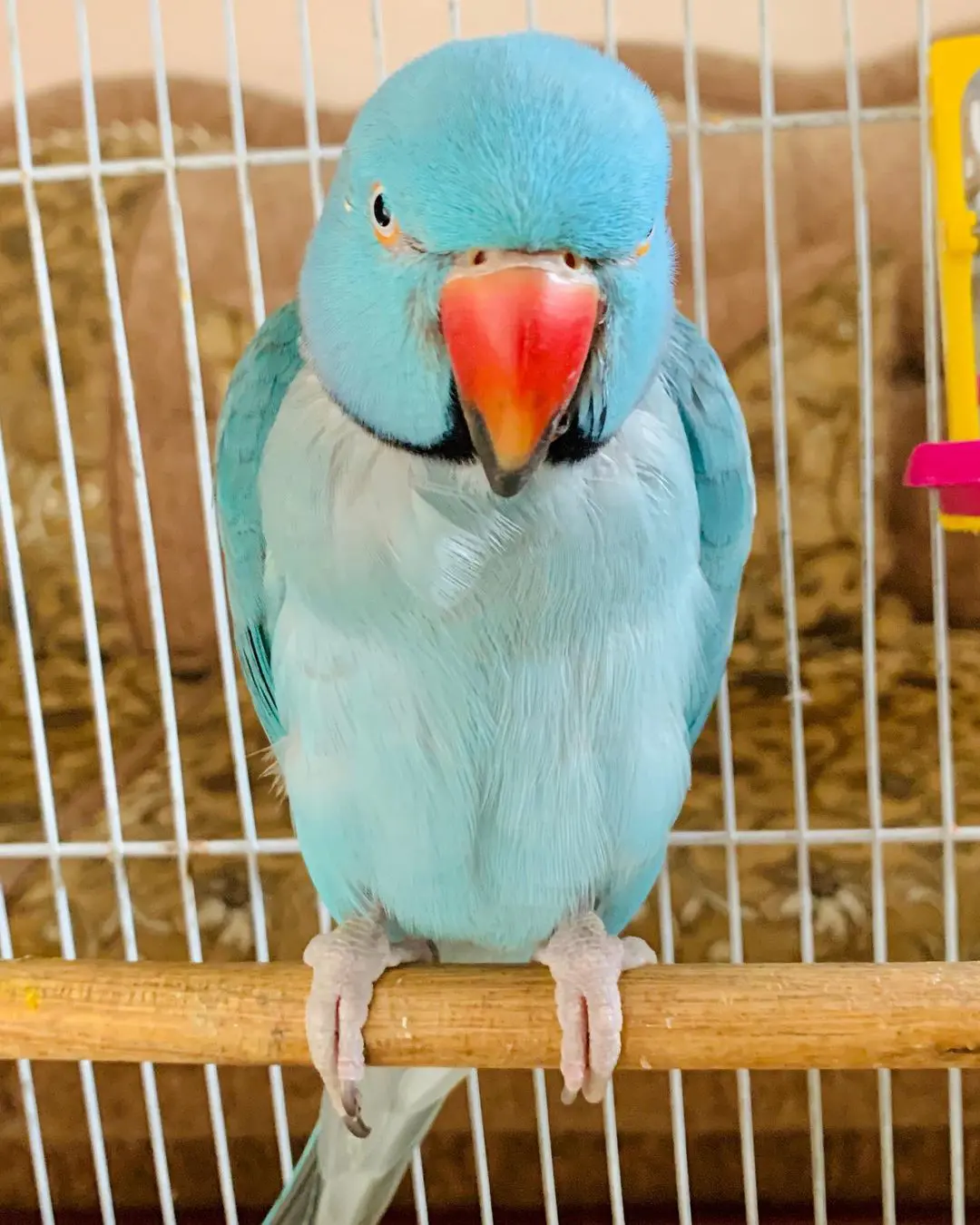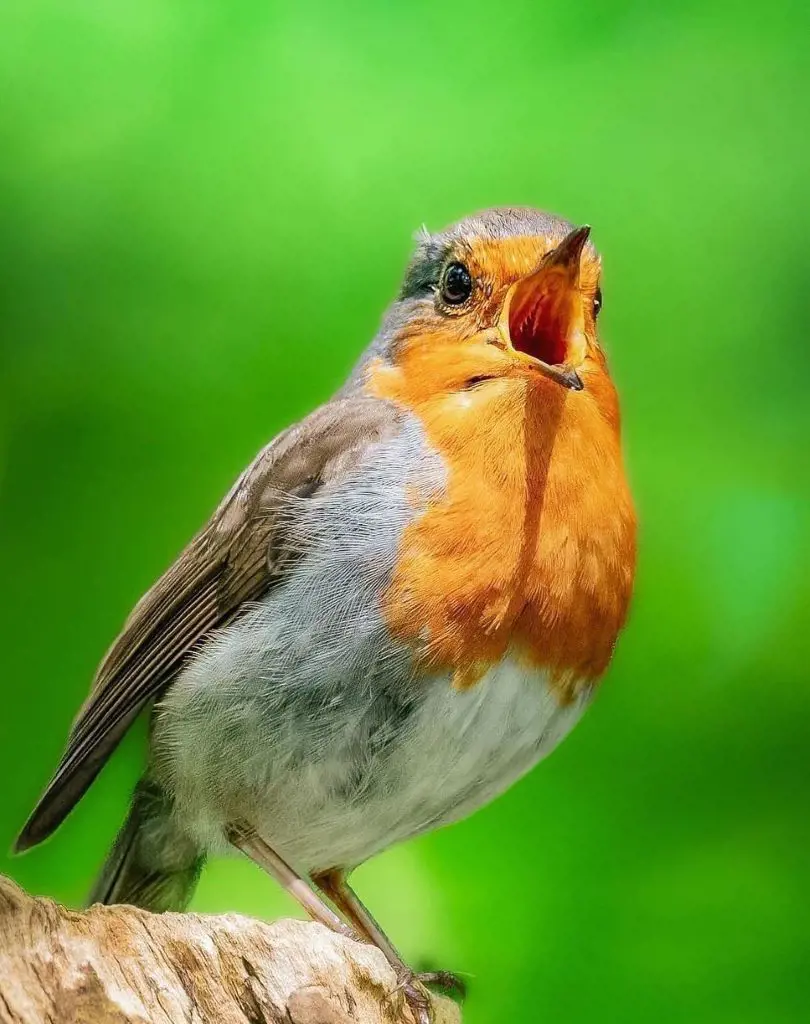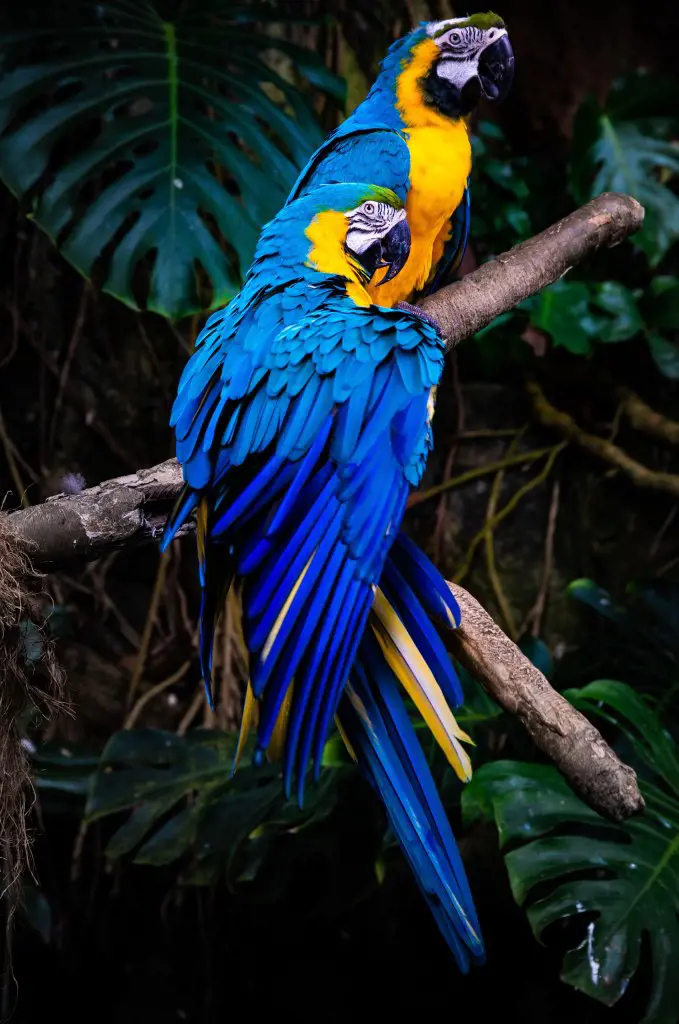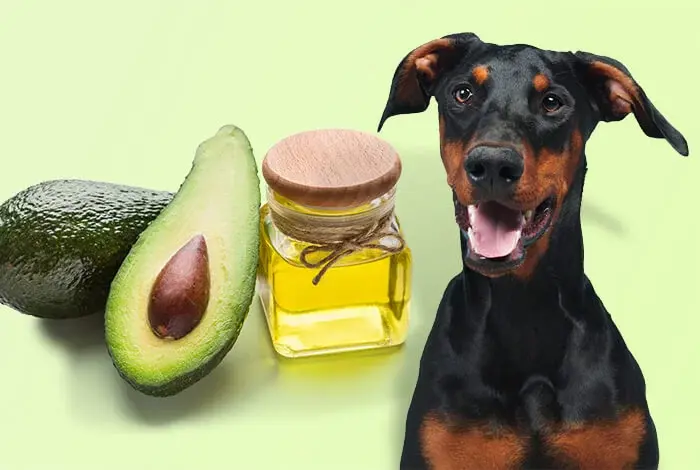What Do Pigeons Eat, And How To Feed Them At Home?
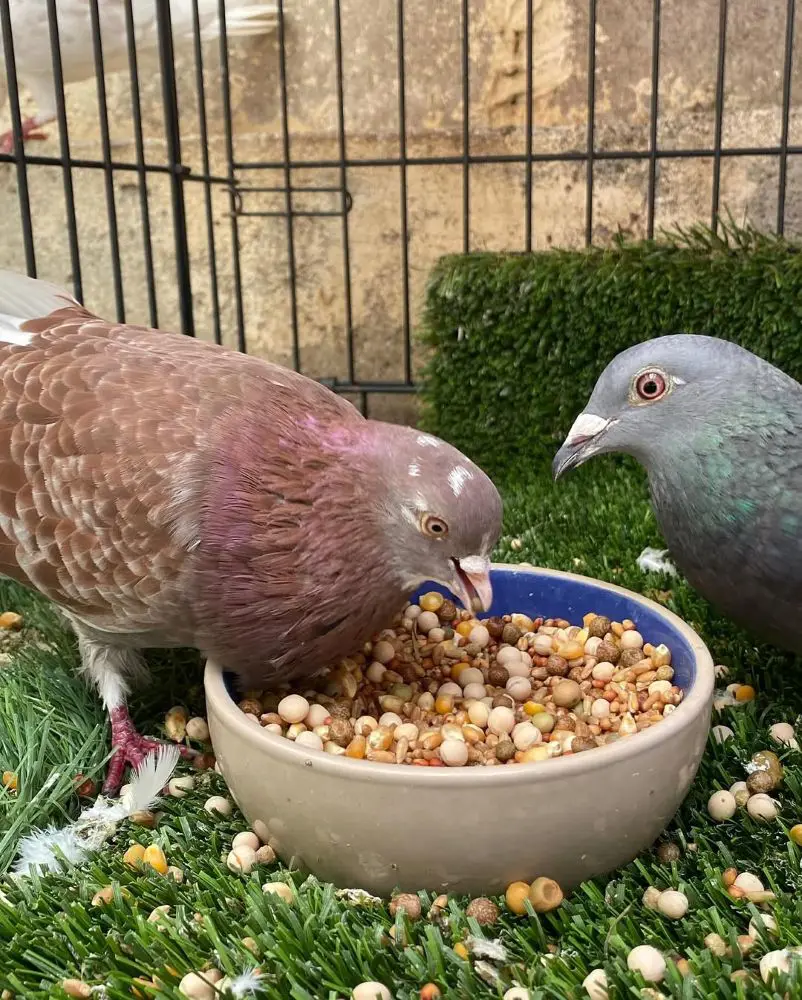
Feeding pigeons is frowned upon and illegal in some places, especially in urban areas. While they appear innocent and harmless, giving them food has been directly linked to bird overpopulation along with an increased frequency of bird droppings in public places.
Despite that, many people love to give food to pigeons due to religious and other reasons. Now, what do these birds eat? Let's discuss some common pigeon foods and the best way to feed them.
1. Grains
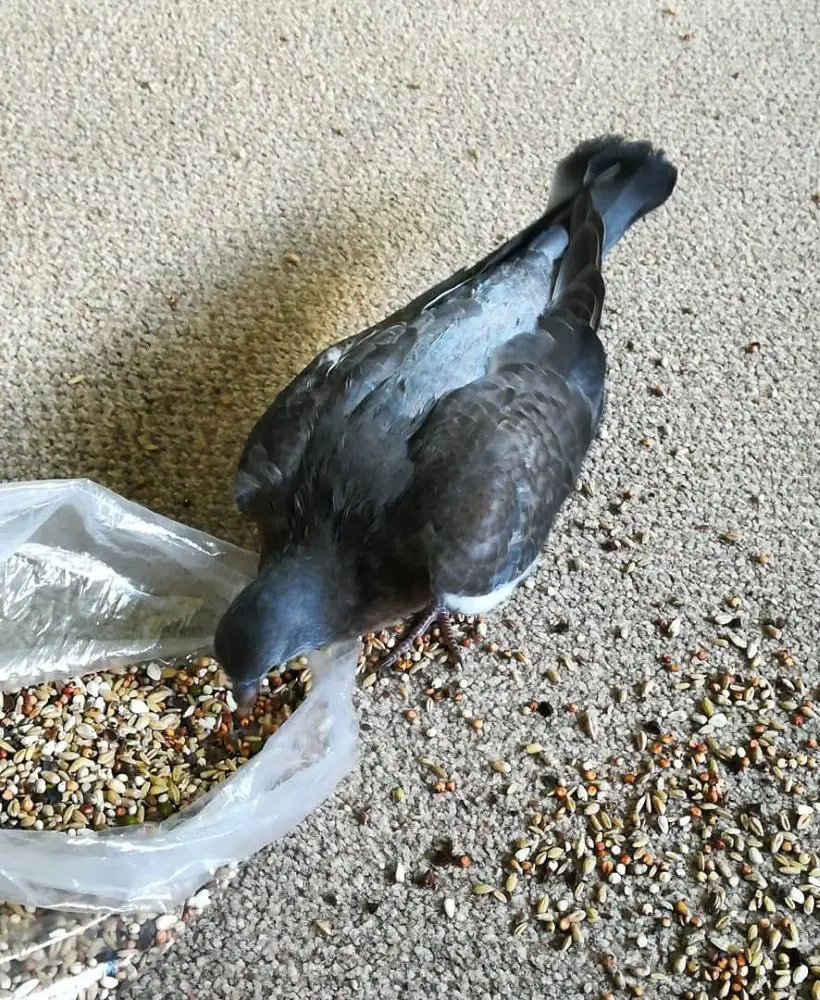
Being the primary source of vital carbohydrates, grains are a considerable part of a pigeon's diet. Among these, corn, wheat, and barley are widely used as pigeon feeds.
At the same time, grains are easily digestible by pigeons, and their availability makes them a staple in most pigeon feed mixes. Each grain has its unique benefit: corn is calorie-dense, wheat supplies fiber, and millet is light yet highly nutritious.
Even though grains are an excellent food option, pigeons cannot thrive on grains alone. An exclusively grain-based diet may lack essential nutrients like proteins, vitamins, and minerals.
2. Seeds
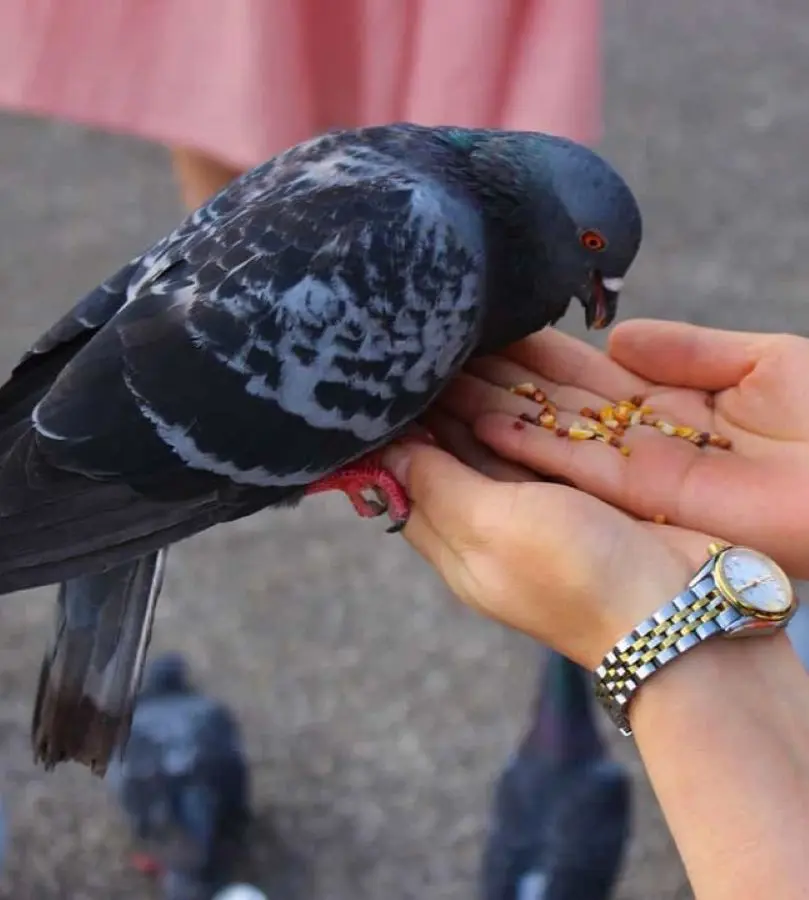
Pigeons can eat seeds directly from plants because it reflects their natural feeding behavior in the wild. Seeds, especially of sunflowers, grass, and millet, are consumed fresh by pigeons.
Seeds are nutrient-rich food and generally safe when picked fresh but should be pesticide- and chemical-free. Fresh seeds from plants may also contain some moisture to help with hydration.
While seeds are healthy for a pigeon, it is dangerous to feed them excessively. Seeds, particularly those with high fat contents like sunflower and safflower seeds, can result in obesity when provided in large amounts.
3. Peas
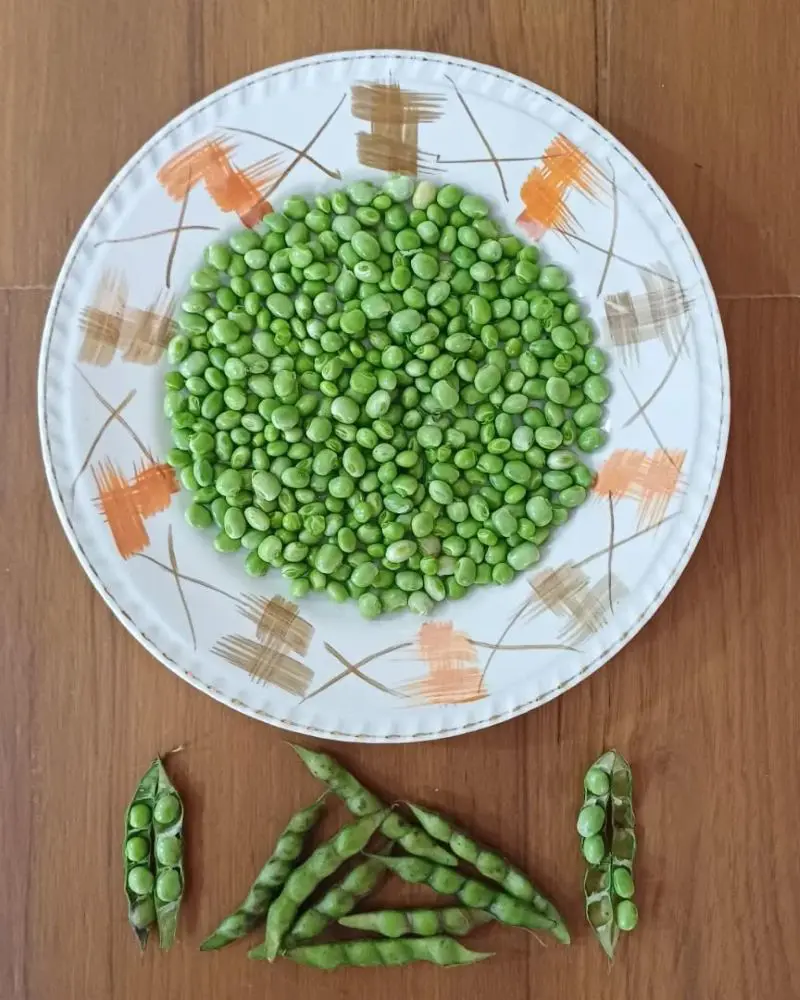
While peas grown by humans and those found in the wild differ, both varieties are healthy and satisfying to pigeons. The natural sweetness of these peas naturally attracts these birds.
Although pigeons love to munch most pea varieties, their favorite ones include green peas, split peas, and dried peas. At the same time, portion size should be controlled when feeding these nutritious foods to your pet pigeon.
Peas can be offered to pigeons daily but in small portions, up to 1-2 tablespoons of pea per feed to an average-sized pigeon. Fresh or lightly steamed peas are probably most welcome to these birds as their digestive system can easily break it down.
4. Rice
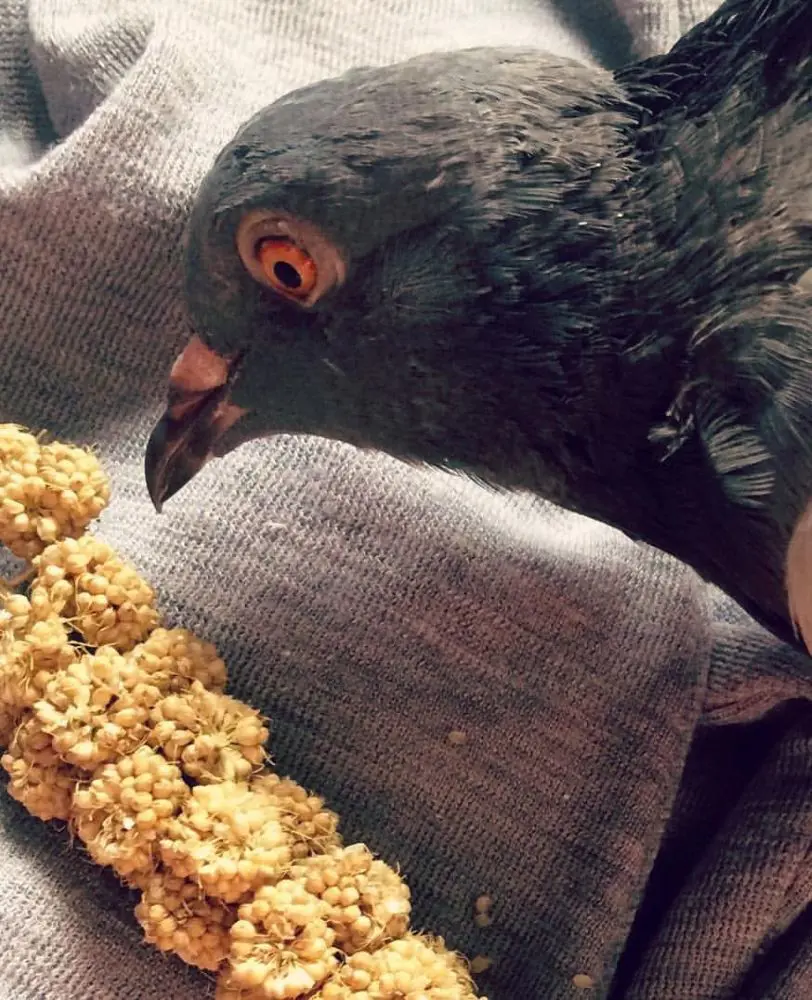
Despite the popular myth that rice is harmful to birds, they can safely eat rice without any ill reaction. Brown and white rice are equally healthy foods, with brown rice having a slight advantage over the white variety in the recommendation of some bird experts.
Similarly, the rice can be cooked or raw; pigeons enjoy rice in any form. There's a common misconception that raw rice, once consumed by the pigeon, can get cooked and swell inside the bird's stomach. However, this myth can easily be debunked just by checking a pigeon's average body temperature (41-43°C) and the temperature which is required for rice to cook (100°C).
5. Fruits
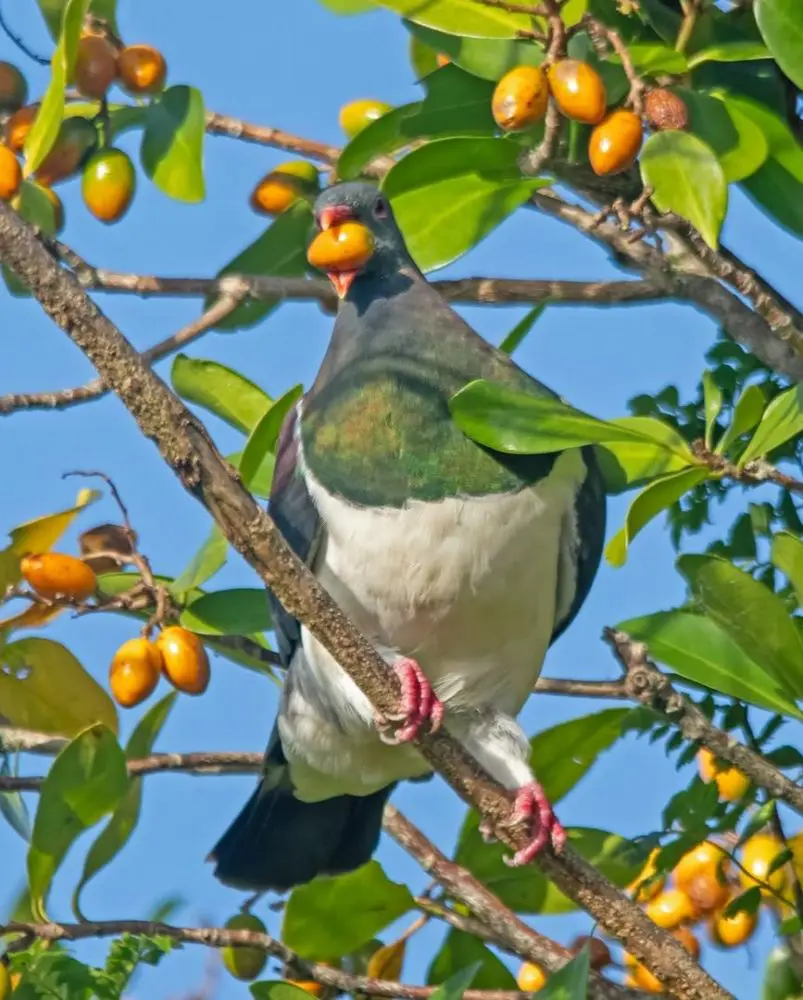
In the wild, fruits are an easy meal for birds; pigeons can easily reach the higher branches of trees where fruits are likely to grow. Besides offering hydration, fruits are also a healthy source of natural sugars and vitamins for birds.
Pigeons can safely eat berries, bananas, apples (seedless), and pears among others. However, some fruits should never be given to pigeons: always avoid avocados as they contain persin toxic to birds. In a similar vein, citrus fruits, like oranges, lemons, etc., must also never be given to pigeons because of their very low pH.
While fruits are healthy, they should never constitute more than 20% of the diet of a pigeon. At the same time, feeding fruits daily in small portions is quite alright, always considering that they form part of a balanced diet.
6. Vegetables
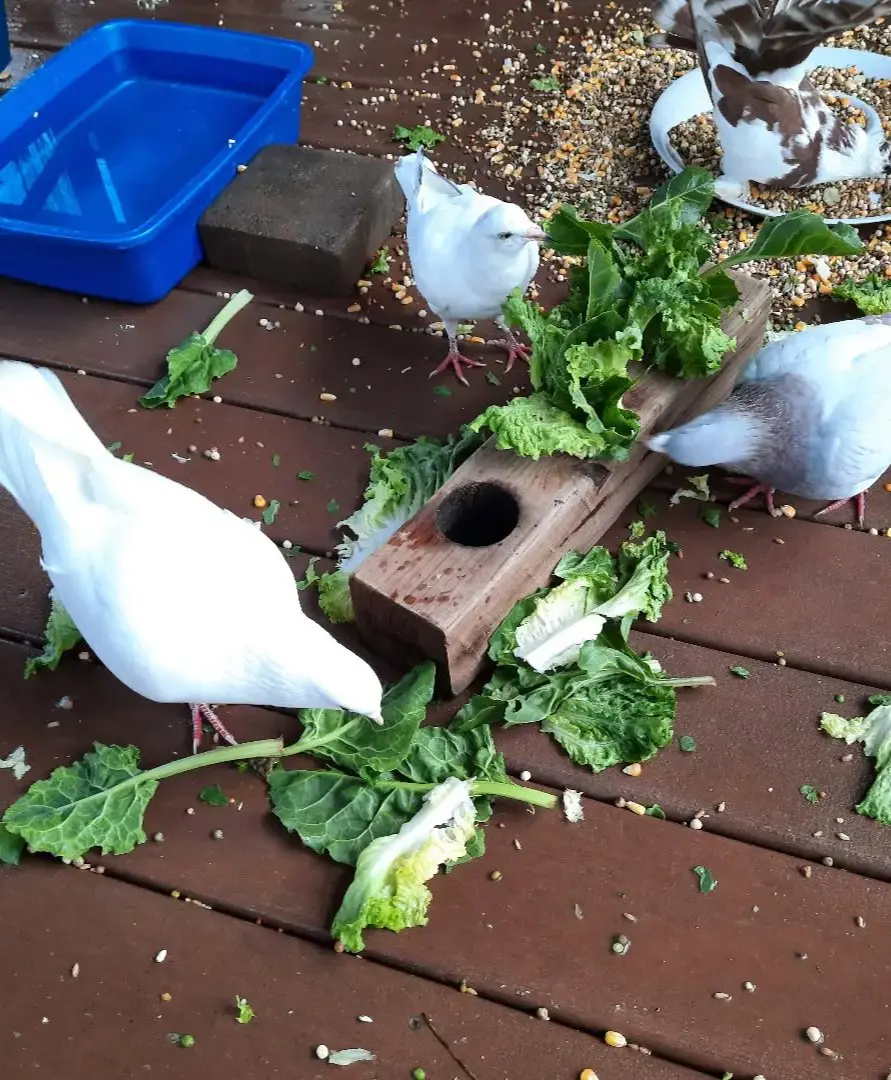
While grains and seeds are the main components of a pigeon's diet, vegetables add variety and several health benefits. From feather health to immune function, vegetables are known to have a great impact on a pigeon's health.
Pigeons love to snack on various vegetables like spinach, kale, broccoli, zucchini, and many others; these can be fresh, washed, and chopped into small pieces for easy consumption.
On the other hand, some vegetables are not easy for them to digest. Such vegetables that owners should avoid feeding their pigeons include onions, garlic, and raw potatoes.
7. Oats
Oats are a healthy cereal grain obtained from the oat plant, which is grown in every temperate region of the world. These plants go through a series of processing phases once they are harvested to present them as edible for human consumption.
The edible oats are further processed into various forms such as rolled oats, steel-cut oats, or instant oats. While the process is necessary to make oats suitable for human consumption, in their natural state, they are an excellent snack for pigeons right from the plant.
Raw oats, be they in their husks or rolled, have a natural sweetness and crunch to them that is naturally attractive to birds. Aside from being a palatable meal for them, oats are also very handy during the cold seasons because the carbohydrates in oats will help the pigeons maintain their internal body heat and energy levels.
8. Bread
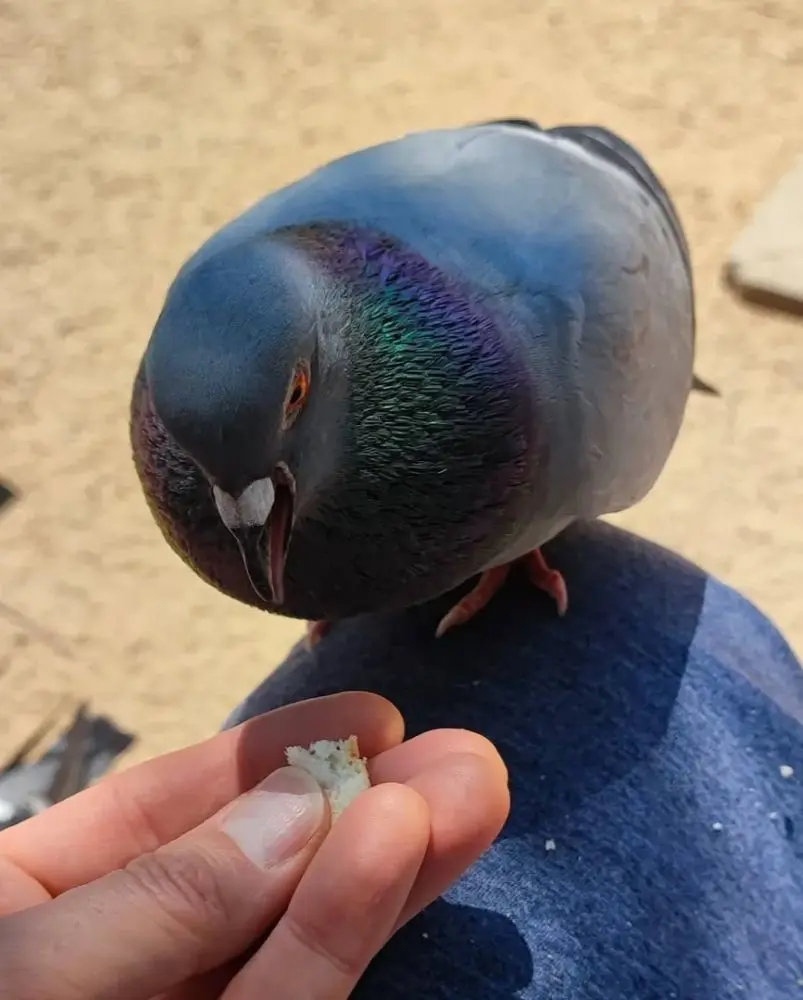
Breads are the equivalent of junk foods for pigeons. While harmless to be eaten occasionally, bread doesn't contain any vital nutrients that pigeons need.
As voracious eaters, pigeons will munch on almost everything including bread. As a matter of fact, they may also enjoy the sweet-sour flavor of bread; however that doesn't mean the food is good for them.
A diet comprised mainly of bread can malnourish pigeons as the food is incredibly low in protein and other essential nutrients. Besides, bread expands when wet, causing digestive blockages or stomach upsets.
9. Grit
Grits, intended to be given to pigeons, are usually composed of small particles of indigestible materials like crushed granite, limestone, or even baked eggshells. Instead of providing any real nutritional value, grits should help them in grinding and further digesting food in their gizzard, a muscular organ meant for breaking down seeds and grains.
Without grit, pigeons can't digest their food properly. Whenever feeding them, always keep the grits in a separate dish; never mix grit with their main food because this will lead to overconsumption.
10. Pellets
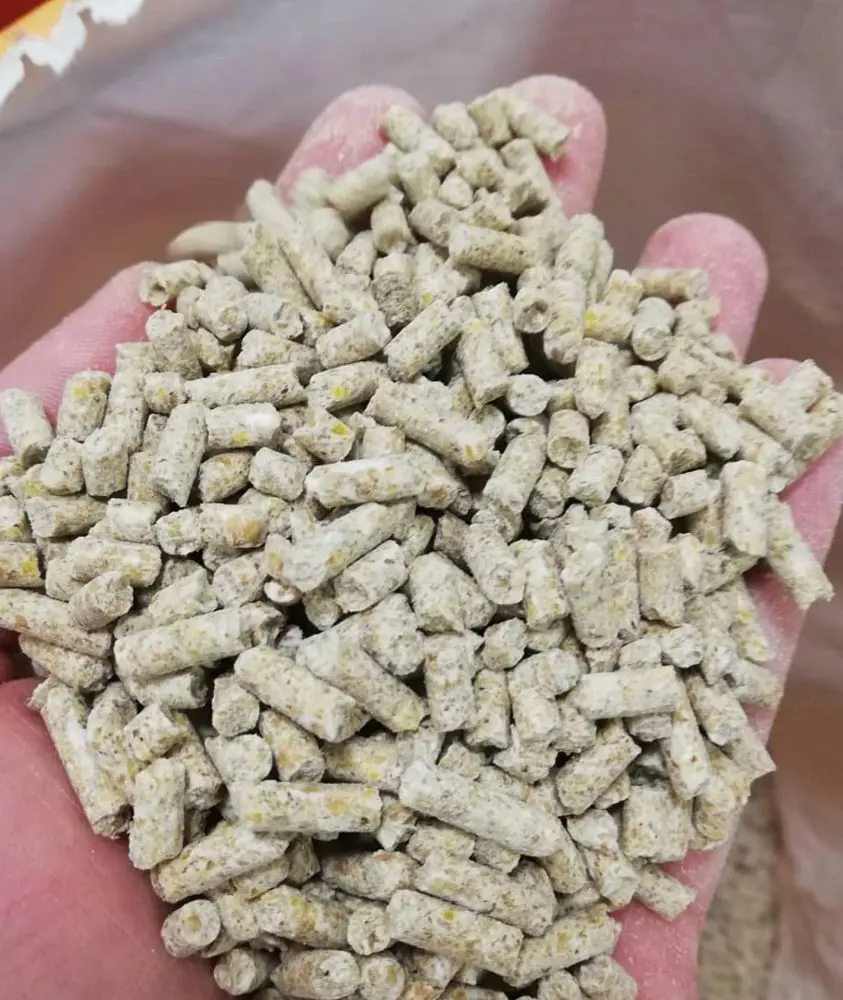
Pellets are prepared nutritionally for the pigeon to satisfy its requirements, mainly in areas with food scarcity, during winter. These commercial feeds are prepared from a myriad of ingredients: seeds, soybeans, grains, and many others.
While pellets can be a staple, supplement them with fresh vegetables, fruits, and occasional grains to provide variety in their diet, similar to their natural feeding behaviors. For an adult pigeon, about 1-2 tablespoons of pellets a day will suffice. Breeding or active birds, however, may need more food to keep them going.
Also, pellets are generally dried out during the manufacturing process, so always provide plenty of fresh water when feeding this meal to your pet.
How To Feed Pigeons? Portion And Feeding Schedule
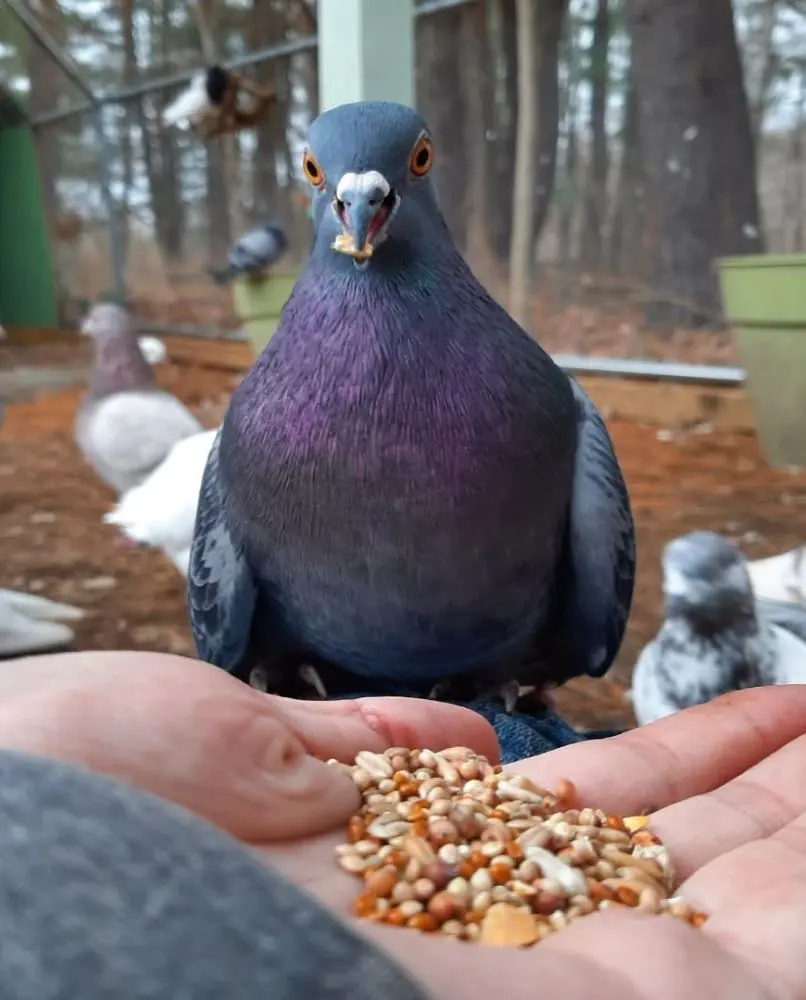
Pigeons, like any other bird, rely on a combination of foods in their growth and maintenance diets. Their diets, in addition to an excellent pigeon mix, need to include a blend of grains, vegetables, fruits, and occasional protein food like mealworms in order to keep them thriving.
Apart from the quality of food, the pigeon feeding pattern is another important factor that many owners of birds tend to miss out on. A healthy diet is useless if the pigeon doesn't get it at the right time or in the proper manner.
How Much Food To Feed Pigeons?
Pigeons have very little control over the amount of food they eat. So, it's up to the owner to make sure that their bird is not getting obese.
Generally, adult pigeons can survive on about 25-30 grams (1-1.5 ounces) of food per day; the quantity is enough to maintain their feather health and energy levels required for different activities.
Meanwhile, baby pigeons will also tend to need more food because of their fast growth nature. Squabs, during their growth stages, can be fed up to 40-50 grams of a healthy pigeon mix daily.
Also, there are conditions wherein these birds require more or less food than the usual amount. For instance, when the weather is cold or during their breeding season, pigeons need more food. On the other hand, when a pigeon becomes sick or stressed, its consumption of food becomes very minimal.
How To Feed Pigeons?
Since pigeons normally forage during the morning and late afternoon, these are the best times of the day to feed these birds. An effective schedule will include two feedings per day, once in the morning and again in the late afternoon or evening.
Offer their first meal shortly after sunrise - this will allow the birds to retain the energy they need to start their daily activities. On the contrary, their second meal should be scheduled a few hours before sunset.
Foods To Avoid With Pigeons
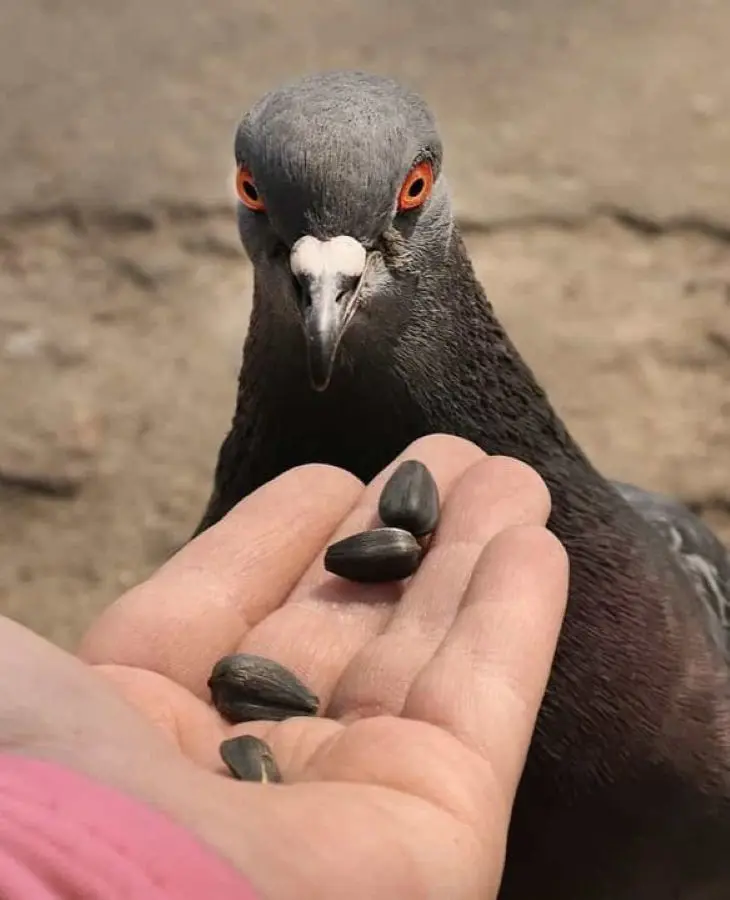
Due to their small size and sensitive digestive systems, pigeons cannot take some foods that are normally harmless to humans. Foods, especially those of a fatty, salty, or sugary nature, are bad for these birds and can cause digestive distress, obesity, or even toxicity.
Without further ado, here are some foods generally considered harmful to pigeons.
1. Avocado
One thing all parts of the avocado plant contain is a toxic substance known as persin, which is poisonous to pigeons. Besides causing respiratory problems, in pigeons, avocados can cause severe heart damage and even death under extreme conditions.
Given the risks, there is no room for including avocado in a pigeon's diet; even in small quantities, it can prove to be injurious to their health. Unlike some other foods, which are toxic if given in large amounts, avocado presents a toxic threat to pigeons with no threshold level being regarded as safe.
2. Lemon
High in acidity, lemons can irritate a pigeon's stomach lining, often triggering diarrhea or other digestive issues. While the sour taste of lemons is not naturally appealing to these birds, it does not prevent them from eating it if they are given the fruit.
Pigeons, as with many birds, do not naturally know to avoid lemons because of their toxicity. They might peck at them out of curiosity, especially if they have never tasted one before.
3. Chocolate
Pigeons cannot metabolize theobromine, an element found in chocolate, as humans can. Even small portions of chocolate can lead to extreme reactions; these include symptoms such as tachycardia, diarrhea, vomiting, and even death.
Chocolate or any foods containing cocoa should be strictly out of a pigeon's access. If your bird accidentally eats chocolate, immediately contact an avian veterinarian for advice.
4. Onion And Garlic
Onion and garlic are two human delicacies that should be completely avoided from a pigeon's diet. The compounds contained in these plants are responsible for oxidative damage in birds, destroying red blood cells.
These foods can eventually cause anemia in pigeons due to a low count of the red blood cells. So, to save your pigeon, cut off any food from their diet which includes onion and garlic as their ingredient.
5. Processed or Sugary Foods
Also besides high content of calories, food high in processed or sugary items usually doesn't have essential nutrition necessary for these birds. Being high in sugar, salt, and high level of saturated fats, this all constitutes an open invitation towards very serious health complications.
Processed foods such as chips, pastries, and candy should completely be avoided; these types of food are not only nutritionally empty but may also offset the balance in the population of good bacteria in a pigeon's stomach.
Top Lists

